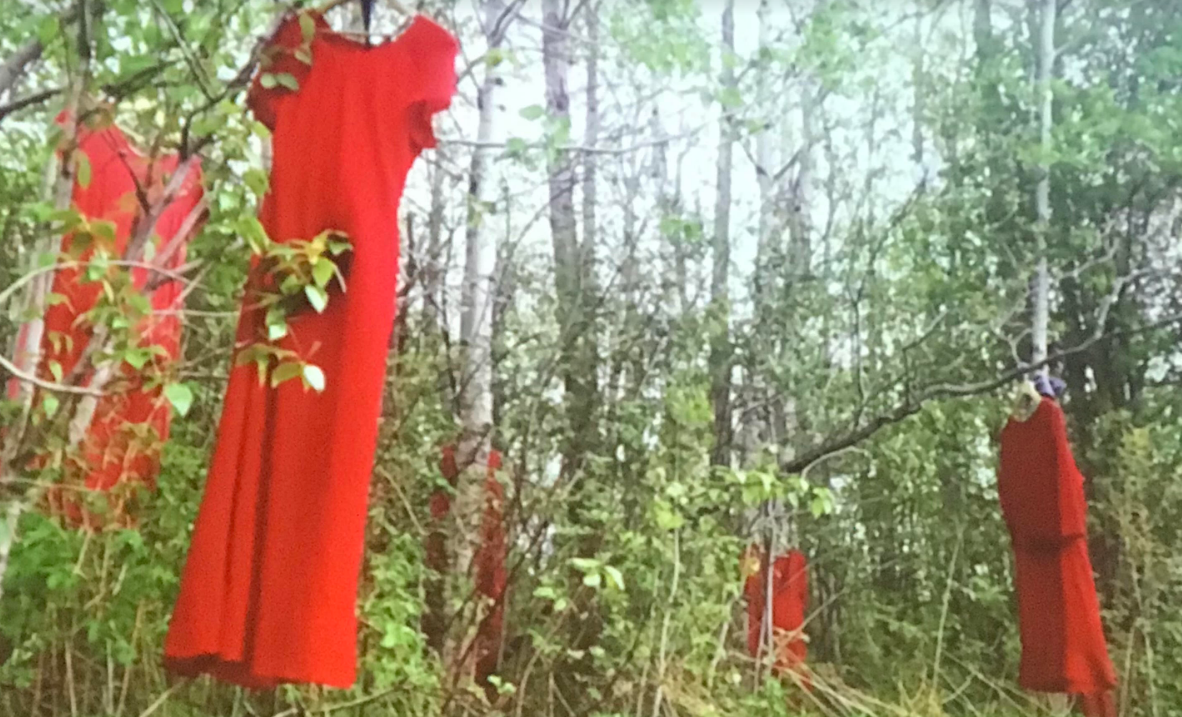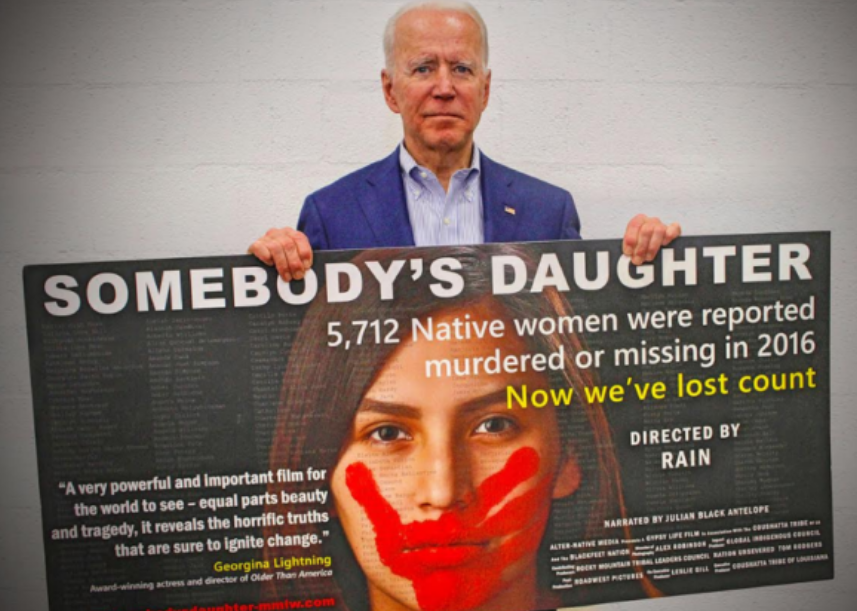
- Details
- By Native News Online Staff
In advance of tomorrow's (May 5, 2023) recognition of Missing and Murdered Indigenous Persons Day, the White House today released a presidential proclamation by President Joe Biden, titled "A Proclamation on Missing Or Murdered Indigenous Persons Awareness Day, 2023."
Across Indian Country tomorrow, Native communities and organization are gathering to draw attention to MMIP Crisis and honor those who have been impacted the most.
Read the entire presidential proclamation below. Presidential candidate Joe Biden shows his support of the MMIP issue. (Photo/File)
Presidential candidate Joe Biden shows his support of the MMIP issue. (Photo/File)
PRESIDENTIAL PROCLAMATION
On Missing or Murdered Indigenous Persons Awareness Day, we remember the many lives shattered or lost, and commit to working with Native communities to find justice, keep families safe, and help them heal.
Indian Country has been gripped by an epidemic of missing or murdered Indigenous people, whose cases far too often go unsolved. Families have been left investigating disappearances on their own, demanding justice for their loved ones, and grieving pieces of their souls. Generations of activists and organizers have pushed for accountability, safety, and change. We need to respond with urgency and the resources needed to stop the violence and reverse the legacy of inequity and neglect that often drives it.
When I ran for President, I promised to work across jurisdictions to break this cycle of violence. Under the leadership of Secretary Deb Haaland, the Department of the Interior created a new unit to speed up investigations, bring families closure, and keep Native communities safe. At our 2021 White House Tribal Nations Summit, I signed an Executive Order that tasked Federal agencies with investigating the causes of this crisis, collecting better data on these overwhelmingly underreported crimes, and developing a strategy to combat this epidemic, which most often impacts women, girls, LGBTQI+ people in the community, and Two-Spirit Native Americans.
At the 2022 Summit, we built on that progress by announcing that all United States Attorneys’ Offices operating in Indian Country would better prioritize addressing this crisis. The Federal Bureau of Investigation has new personnel focusing specifically on missing and murdered Indigenous cases. The Departments of Justice and Interior are coordinating their efforts to more effectively investigate and prosecute these crimes using trauma-informed and culturally responsive approaches. The Department of Justice established a new position devoted to ensuring victims and their families have a voice throughout the criminal justice process.
My Administration is helping Native American survivors and victims’ families pursue justice in Tribal courts too. Last year, I worked with the Congress to reauthorize and strengthen the Violence Against Women Act — a law that I first wrote as a United States Senator over 30 years ago to end the scourge of gender-based violence. This time, we expanded recognition of Tribal courts’ jurisdiction over non-Native perpetrators suspected of committing crimes of stalking, sexual assault, child abuse, and sex trafficking on Tribal lands. At the same time, we are investing in shelters and rape crisis centers on Tribal lands, housing and legal assistance for survivors, and trauma-informed training that helps law enforcement and courts be more responsive. We are working to address the underlying causes of violence, from human trafficking to longstanding economic disparities, systemic racism, historical trauma, and the need for services to address substance use disorders.
Our efforts are guided by Indigenous survivors and victims’ families — and by our enduring Nation-to-Nation relationships. That is why we have convened Tribal leaders, law enforcement, service providers, survivors, and family members of missing and murdered people to work together to combat this epidemic and support paths to healing. The United States is also working with the governments of Mexico and Canada, and with Indigenous women leaders from all three countries, to better coordinate our response — all the while ensuring that we uphold our solemn trust and treaty responsibilities, strengthening our Nation-to-Nation ties.
For the thousands of families who have lost or are still looking for a friend or loved one, I know this day is full of purpose and pain. Know that your fight to cast light on these injustices has already saved lives. Our Government has a solemn obligation to ensure that every case of a missing or murdered Indigenous person is met with swift, effective action to finally bring justice and healing. Together, we will get that done.
NOW, THEREFORE, I, JOSEPH R. BIDEN JR., President of the United States of America, by virtue of the authority vested in me by the Constitution and the laws of the United States, do hereby proclaim May 5, 2023, as Missing or Murdered Indigenous Persons Awareness Day. I call on all Americans and ask all levels of government to support Tribal governments and Tribal communities’ efforts to increase awareness and address the issues of missing or murdered Indigenous persons through appropriate programs and activities.
IN WITNESS WHEREOF, I have hereunto set my hand this fourth day of May, in the year of our Lord two thousand twenty-three, and of the Independence of the United States of America the two hundred and forty-seventh.
—JOSEPH R. BIDEN JR.
More Stories Like This
Native News Weekly (August 25, 2024): D.C. BriefsDeb Haaland Earns Endorsement From Communications Workers of America Local 7076
University Soccer Standout Leads by Example
Two Native Americans Named to Democratic Congressional Campaign Committee's“Red to Blue” Program
Cheyenne River Youth Project Hosts Young Women’s Winter Camp as Part of Lakota Culture Internship
Help us defend tribal sovereignty.
At Native News Online, our mission is rooted in telling the stories that strengthen sovereignty and uplift Indigenous voices — not just at year’s end, but every single day.
Because of your generosity last year, we were able to keep our reporters on the ground in tribal communities, at national gatherings and in the halls of Congress — covering the issues that matter most to Indian Country: sovereignty, culture, education, health and economic opportunity.
That support sustained us through a tough year in 2025. Now, as we look to the year ahead, we need your help right now to ensure warrior journalism remains strong — reporting that defends tribal sovereignty, amplifies Native truth, and holds power accountable.
 The stakes couldn't be higher. Your support keeps Native voices heard, Native stories told and Native sovereignty defended.
The stakes couldn't be higher. Your support keeps Native voices heard, Native stories told and Native sovereignty defended.
Stand with Warrior Journalism today.
Levi Rickert (Potawatomi), Editor & Publisher


